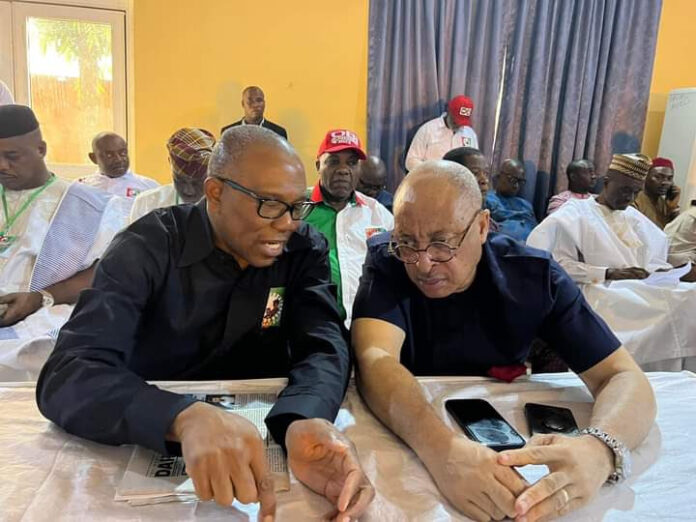Political economist, Prof Pat Utomi, has sharply criticized Nigerian governments, accusing them of treating the nation’s youth with disdain and disrespect over the years. Speaking on Channels Television’s Sunrise Daily on January 2, Utomi expressed his frustration with the persistent lack of trust between young Nigerians and their leaders.
In a passionate address, Utomi, a former presidential candidate and the founder of the Centre for Value and Leadership, stressed that governments, both military and civilian, have failed to uphold their promises to the younger generation. He pointed out the irony of the situation, noting that many of the country’s former military leaders—who were responsible for the administration of Nigeria during critical periods—were themselves in their twenties and thirties.
“The Nigerian government has treated young people like they are idiots,” Utomi declared. “It’s not a new thing. Successive administrations have shown a lack of commitment to youth development, and it is time for them to admit this failure openly.”
The political economist’s statements resonate deeply with the ongoing disillusionment among Nigerian youth. According to Utomi, the disconnect stems from a history of broken promises, corruption, and ineffective leadership, compounded by Nigeria’s oil wealth. He attributes this longstanding issue to the rise of a new class system, which he believes has systematically marginalized the youth, leaving them without the opportunity to thrive.
“Most governments in Nigeria have been untrustworthy. Let’s face it. The same youths who were once in charge of running the country are now being disregarded. This is tragic,” Utomi lamented. “Look at the history of military rule. Most of the military leaders in Nigeria were in their 20s and 30s when they took power. But as time went on, the nature of governance shifted, and young Nigerians were pushed aside in favor of a more entrenched, hierarchical system of leadership.”
The conversation quickly turned to the upcoming national youth conference planned by the President Bola Tinubu administration. Utomi, however, was skeptical about its effectiveness if the government did not take a more sincere approach. For the conference, which is set for the first quarter of 2025, to be meaningful, Utomi called for a radical shift in government rhetoric and actions. He emphasized the need for leaders to recognize the deep sense of betrayal felt by the youth and to begin by issuing an apology for the years of neglect and mismanagement.
“Any government that doesn’t first acknowledge that it is not trusted is wasting time. To rebuild trust, you must begin with a sincere apology, backed by an unwavering commitment to right the wrongs done to the younger generation,” Utomi asserted.
Drawing from his extensive experience in political and economic reform, Utomi proposed that effective leadership must prioritize transparency and reliability. He referenced the concept of an “emotional bank account,” a metaphor used in leadership and business psychology to explain how trust is built or destroyed over time.
“The first thing any government needs to do is build that emotional bank account,” Utomi explained. “Every time a government makes a promise and delivers on it, it makes a deposit into the account. But every time a government fails to meet its promises, it withdraws. Over time, whether a government is trusted or not depends on the balance in that emotional bank account.”
The idea of building trust through consistent, honest actions is central to Utomi’s vision for improving governance. He stressed that young Nigerians are weary of vague promises and the frequent disconnect between what is said by leaders and what is actually done. According to Utomi, the critical issue is not just words but actions that align with those words.
Utomi’s comments strike at the heart of a larger issue in Nigeria: the frustration among young people, especially in urban areas, who feel trapped by a system that offers little opportunity for meaningful change. With unemployment rates soaring and many young people leaving the country in search of better prospects abroad, trust in the government has reached an all-time low.
In fact, Utomi’s critique of Nigeria’s leadership style echoes the sentiments of many Nigerians who feel left out of political processes and national development. Several youth organizations have already begun calling for greater representation in governance, emphasizing the need for young people to be included in decisions that directly affect their futures.
For the Tinubu administration, which has made several promises to address youth unemployment and economic challenges, the road ahead will require more than just organizing conferences. It will take a concerted effort to change the prevailing political culture that has often sidelined the aspirations of young Nigerians. In recent times, the government has tried to engage with youth-led organizations, but many are still skeptical of the true intentions behind such outreach efforts.
The political economist’s remarks also highlight the urgent need for a shift in Nigeria’s political narrative. Too often, young people are either ignored or stereotyped as being uninterested in national affairs. Yet, Utomi insists that the younger generation holds the key to the country’s future prosperity and must not be treated with such disdain.

